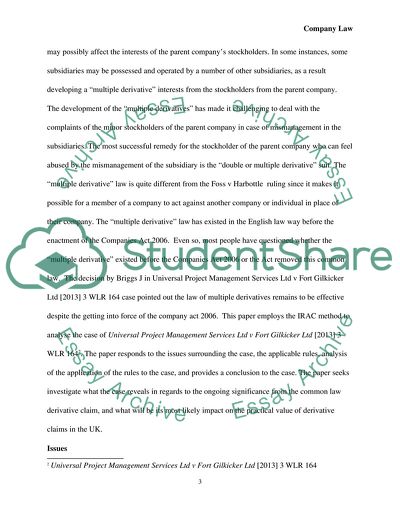Cite this document
(“Company law; Universal Project Management Services Ltd v Fort Essay”, n.d.)
Retrieved from https://studentshare.org/law/1687536-company-law-universal-project-management-services-ltd-v-fort-gilkicker-ltd-2013-3-wlr-164-is-a-landmark-case-as-it-clarifies-that-multiple-derivative-claim-are-permissible-at-common-law-what-does-this-case-reveal-with-regard-to-the-continuing-significan
Retrieved from https://studentshare.org/law/1687536-company-law-universal-project-management-services-ltd-v-fort-gilkicker-ltd-2013-3-wlr-164-is-a-landmark-case-as-it-clarifies-that-multiple-derivative-claim-are-permissible-at-common-law-what-does-this-case-reveal-with-regard-to-the-continuing-significan
(Company Law; Universal Project Management Services Ltd V Fort Essay)
https://studentshare.org/law/1687536-company-law-universal-project-management-services-ltd-v-fort-gilkicker-ltd-2013-3-wlr-164-is-a-landmark-case-as-it-clarifies-that-multiple-derivative-claim-are-permissible-at-common-law-what-does-this-case-reveal-with-regard-to-the-continuing-significan.
https://studentshare.org/law/1687536-company-law-universal-project-management-services-ltd-v-fort-gilkicker-ltd-2013-3-wlr-164-is-a-landmark-case-as-it-clarifies-that-multiple-derivative-claim-are-permissible-at-common-law-what-does-this-case-reveal-with-regard-to-the-continuing-significan.
“Company Law; Universal Project Management Services Ltd V Fort Essay”, n.d. https://studentshare.org/law/1687536-company-law-universal-project-management-services-ltd-v-fort-gilkicker-ltd-2013-3-wlr-164-is-a-landmark-case-as-it-clarifies-that-multiple-derivative-claim-are-permissible-at-common-law-what-does-this-case-reveal-with-regard-to-the-continuing-significan.


